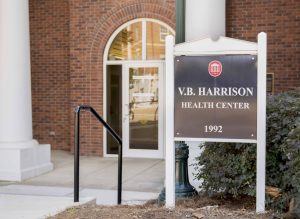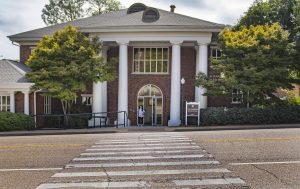Kennedy Frain is afraid of going to the doctor, but it isn’t a procedure that scares her — it’s the cost.
Frain, a junior studying elementary education and recreation administration, said that her finances get in the way of healthcare. She is able to attend the university through Pell Grants and the Ole Miss Opportunity scholarship, which cover her tuition and living expenses, but there is no allotment for healthcare. When Frain got a stomach virus freshman year, she had to weigh her finances against her health.

“I went to the (on-campus) health center, and I had to ask them, ‘How much is this going to cost?’” she said.
Upon hearing the answer, she decided to take her chances without treatment.
Frain said she is thankful for a good immune system, but she worries about those who aren’t so lucky, especially those without the money for appropriate care.
“I know a lot of college students that have to sacrifice health insurance to go to school,” she said. “I know some people that haven’t been to the dentist since they were a kid. I guess they’re waiting on a job after college. It’s really sad.”
At the V. B. Harrison Health Center, the issues of health costs are often increased because Blue Cross Blue Shield and Student Aetna are the only insurance providers accepted as in-network. Students who have out-of-network policies may have to pay 25-to-50 percent more than students with in-network plans, though differences vary widely between plans. In 2016, the student health center accepted more insurance policies in-network than it does currently.
Lindsay Fournier, a junior studying biology and chemistry, was surprised by the change in policy when she was told the health center would not accept her insurance when she was sick last spring. In previous visits, her insurance was accepted, and there was no fee for her care.
Even with “pretty decent insurance,” she was not covered in network at the student health center in full, she said. She went to Urgent Care instead, where she was charged $95 for bloodwork and medication because the deductible had not yet been met.
“For students that are uninsured, we are probably the best deal they have,” University Health Services Director Dr. Travis Yates said. “There is nowhere else in town they can go without a provider fee.”
Without a provider fee, students can be seen for free, but charges for tests, medications and supplies are added to their bursar accounts.
“If a student were to say ‘Dr. Yates, I have no money, and you need to try to get me out of here as cheaply as you can,’ I will try to get them out of here with no testing if we can,” Yates said.
Though lab testing is not always needed, voluntarily bypassing it can make diagnoses less accurate. The student and physician must come to a consensus on what is financially and medically possible to treat a symptom.
“The uninsured receive fewer preventive and diagnostic services, tend to be more severely ill when diagnosed and receive less therapeutic care,” researcher Jack Hadley said in a study for the Urban Institute. “Improving health status from fair or poor to very good or excellent would increase both work effort and annual earnings by approximately 15 percent to 20 percent.”
This is primarily because of the high cost of healthcare for those without health insurance, according to Hadley.
A report from the Lookout Mountain Group estimates that nearly one in ten undergraduate students had no health insurance in 2016, down from two in ten in 2010.
“I think there will always be a financial impediment to care,” Yates said. “The way we manage that is that fees are low across the board so those without insurance can hopefully afford it.”
Even so, there are still students who refuse care because they cannot afford it. The student health center does not subsidize the fees of low-income or uninsured students, in part due to its own concerns about funding.
“Are we funded to the degree that we need? No, we’re not,” Yates said, adding that the student health center never sees students as a financial reimbursement source. “But that isn’t meant to be negative toward our administration. They give us as much financial support as they have available through our budgetary process.”
The total operating expenses for the university last year totaled $597 million, with approximately $2.9 million of that spent on student health services.
The student health center is not the only underfunded service for student health on campus. The University Counseling Center, which includes clinical services, outreach programs and laboratory training for graduate students, is funded with about $761,000 per year.
“If we were appropriately staffed and had money for our expanding training program, we would probably need a little over twice as much money as we currently receive,” Dr. Bud Edwards, the director of the center, said.
The University Counseling Center is not currently accredited by the International Association of Counseling Services, like counseling centers at half of SEC schools. According to accreditation standards, the university would need 13 people on staff in the center for student counseling. It currently has seven counseling staff members.
Edwards said the university is “pretty close to the bottom” of the SEC in terms of funding the center.
Because of underfunding, the students who seek clinical services may not receive treatment or may have a long waiting period unless they are at a point of crisis.
“It’s an uncomfortable place for a provider to be. You don’t like to think you can’t be helpful to someone that has come and said ‘I need some help.’ That’s an uncomfortable place to be,” Edwards said. “But it’s a reality that we have to try to live with and address as best as we can year-in and year-out.”
Edwards explained that, like many other departments, the counseling center faced underfunding in a time when the student body was growing faster than the university infrastructure could.

Though it will not be enough for accreditation, the counseling center has received funding that will affect mental health on campus. The provost has approved funding for two temporary staff members to accommodate increased demand on clinical services.
“I think the university administration sees us as a priority,” Edwards said.
According to Edwards, the administration has been responsive to his requests for funding and staff.






